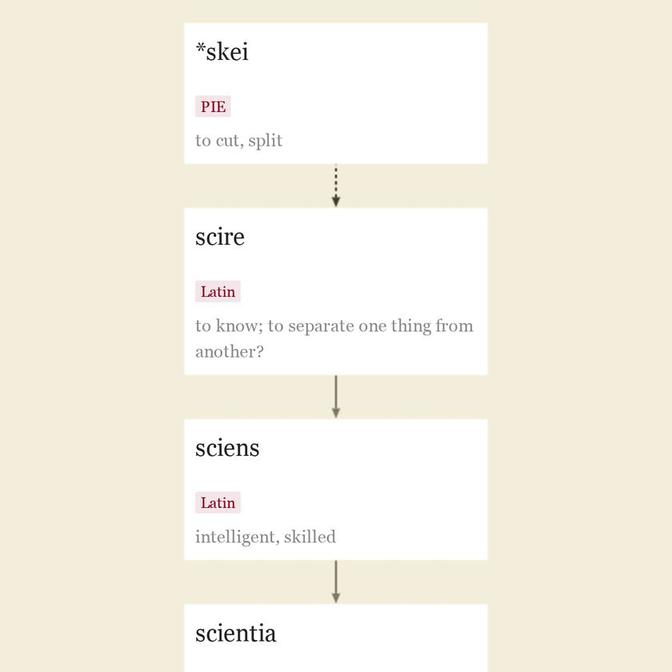plebiscite (n.)
"全民直接投票,表达整个人民对某个已经决定的事情的意愿或喜好",1852年(最初是指法国),源自法语 plébiscite(1776年开始使用,最初是指瑞士),源自拉丁语 plebiscitum “人民的法令或决议”,由 plebs(属格 plebis)“平民百姓”(参见 plebeian(形容词))和 scitum “法令”组成,后者是 sciscere “赞成、投票、批准”的不及物动词的完成体,是 scire “知道”(参见 science)的始动体。早在16世纪30年代,该词已在纯粹的历史背景下使用,指“古罗马下层公民在平民官员主持下召开的会议中制定的法律”。该词早在古典语境中就有过使用。相关词汇: Plebiscitary。
plebiscite 的相关词汇
"of or characteristic of the lower class or the common people," was first used in 1560s in a Roman historical context, originates from Latin word plebeius , which means "belonging to the plebs ." Before that, it meant plebes , referring to "the populace, the common people" (as opposed to patricians, etc.). It also referred to "commonality; the mass, the multitude; the lower class" (from PIE *ple- , from the root *pele- (1) "to fill"). The word was generally used from the 1580s onwards.

14世纪中叶,“知道的状态或事实; 通过学习获得的知识; 信息; ”还有“知识的确信,确定性”,源自古法语 science “知识,学问,应用; 人类知识体系”(12世纪),源自拉丁语 scientia “知识,认识; 专业知识”,源自 sciens(属格 scientis)“聪明的,有技能的”, scire 的现在分词“知道”。
拉丁动词中最初的概念可能是“将一件事物与另一件事物分开,区分”,或者“切割”。这与 scindere “切割,分割”有关(源自 PIE 词根 *skei- “切割,分裂”; 希腊语 skhizein “分裂,撕裂”,哥特语 skaidan,,古英语 sceadan “分割,分离”)。
OED 写道,该词在英语中最早的意义现在仅限于神学和哲学。从14世纪末开始,它指的是“书本学问”,也指的是“特定的知识领域或学科,系统化的关于特定对象群的知识”; 还有“技能,聪明才智; 狡猾”。从约1400年开始,它指的是“经验性知识”; 还指“训练所得的技能,手艺; 一门行业”。
从14世纪末开始,它更具体的意义是“人类集体知识”,尤其是通过系统观察、实验和推理获得的知识。现代(限定的)意义上的“关于特定主题或推测的一系列常规或系统观察或命题”的概念可以追溯到1725年; 在17世纪至18世纪,这通常是 philosophy。
“非艺术学科”的意义可追溯到1670年代。通常理解的区别是希腊语 epistemē 的理论真理和实现实际结果的方法(tekhnē),但有时 science 用于实际应用, art 用于技能应用。
主要的现代用法,“自然和物理科学”,通常限于对物质宇宙及其规律现象的研究,可追溯到19世纪中叶。
The men who founded modern science had two merits which are not necessarily found together: Immense patience in observation, and great boldness in framing hypotheses. The second of these merits had belonged to the earliest Greek philosophers; the first existed, to a considerable degree, in the later astronomers of antiquity. But no one among the ancients, except perhaps Aristarchus, possessed both merits, and no one in the Middle Ages possessed either. [Bertrand Russell, "A History of Western Philosophy," 1945]
创立现代科学的人们具有两个不一定同时具备的优点:对观察的极大耐心和对假设的大胆。这两个优点早期的希腊哲学家拥有; 第一个优点在古代后期的天文学家中也存在相当程度; 但古代没有人同时具备这两个优点,中世纪也没有人具备其中任何一个。[伯特兰·罗素,《西方哲学史》,1945年]
Science, since people must do it, is a socially embedded activity. It progresses by hunch, vision, and intuition. Much of its change through time does not record a closer approach to absolute truth, but the alteration of cultural contexts that influence it so strongly. Facts are not pure and unsullied bits of information; culture also influences what we see and how we see it. Theories, moreover, are not inexorable inductions from facts. The most creative theories are often imaginative visions imposed upon facts; the source of imagination is also strongly cultural. [Stephen Jay Gould, introduction to "The Mismeasure of Man," 1981]
科学是一种社会嵌入的活动,因为人们必须进行科学研究。它通过直觉、视野和直觉来进步。它的变化往往不是接近绝对真理的结果,而是文化背景的改变对其产生了强烈影响。事实并不是纯粹而无瑕的信息碎片; 文化也影响我们看到事物的方式。此外,理论并不是从事实中不可避免地归纳出来的。最有创造力的理论往往是对事实施加的富有想象力的愿景; 想象力的源泉也在很大程度上受到文化的影响。[斯蒂芬·杰·古尔德,《人的错误测量》,1981年]
- *pele-
- *skei-